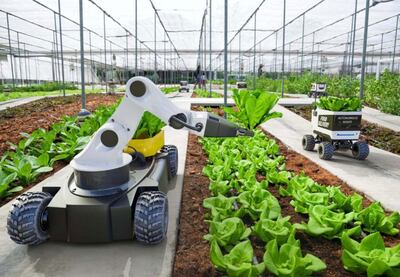The UAE and US unveiled a joint initiative to drive rapid and transformative climate action in the agriculture sector at Cop26 on Tuesday, as they look to boost investment in science and innovation to ensure the sector contributes to solving the climate crisis.
The Agriculture Innovation Mission for Climate (AIM for Climate) has mobilised $4 billion of increased investment to enhance resilience to climate change, including a $1bn contribution from the UAE.
The UAE-US initiative is the first global agriculture and climate change coalition of its kind. AIM for Climate’s diverse list of supporters comprises more than 30 countries from six continents, including the recent addition of Azerbaijan, Canada, and the UK.
Other backers include prominent non-governmental agencies, such as the Bill and Melinda Gates Foundation, as well as the multilateral Food and Agriculture Organisation.
“AIM for Climate is focusing on a sector that has been previously overlooked in terms of the opportunities it offers for global climate action," said Dr Sultan Al Jaber, the UAE's Minister of Industry and Advanced Technology, and Special Envoy for Climate Change.
"This initiative demonstrates the UAE’s holistic and inclusive approach to climate action, which characterises our offer to host Cop28.
"The United Arab Emirates has already driven change in the energy sector through green innovation and growth, investing over $17bn in clean energy around the world. AIM for Climate is a smart extension of that investment strategy, and the UAE is pleased to pledge $1bn as part of the initiative.”
Agriculture is a major part of the climate change challenge facing the world because it contributes about 25 per cent of all greenhouse gas emissions. Food security is also at risk as the world’s growing population becomes increasingly dependent on climate-vulnerable food production.
Although the sector has been recognised as a major contributor to global warming, there has been limited investment to date.
The AIM Climate initiative was first previewed by Sheikh Mohammed bin Rashid, Vice President and Ruler of Dubai, and US President Joe Biden at his Leaders’ Summit on Climate in April. The initiative aims to help the agriculture industry meet the target set out in the Paris Agreement to limit global warming to 1.5°C above pre-industrial levels.
“The United States is proud to be launching the Agriculture Innovation Mission for Climate initiative alongside the United Arab Emirates and over 80 partners across the globe," said John Kerry, US special presidential envoy for climate.
"Investment in climate-smart agriculture innovation is critical to addressing the climate crisis. Innovation can reduce emissions, feed the world’s growing population, and help farmers and ranchers mitigate and adapt to climate change.
"AIM for Climate has an impressive start, garnering $4bn in increased investment in climate-smart agriculture and food systems innovation thus far.”
The initiative wants to unite participants and attract much-needed investment in climate-smart agriculture and food systems innovation that will address global hunger challenges and increase sustainable economic growth.
Greater investment in these areas can ensure agriculture becomes part of the solution to addressing climate change, according to AIM Climate, by helping to inform science-based, data-driven decision-making and policies.
In turn, this will help to achieve breakthroughs in technologies and approaches that adapt food production to the world’s harsher climate, with the UAE already proving to be a pioneer in the agritech field as it looks to meet more of its food requirement through locally grown produce.

The GCC imports between 80 per cent and 90 per cent of its food requirements, according to British think tank Chatham House, with better food security a top priority for the UAE, which is the second-biggest Arab economy.
Separately, the UAE was the first country in the GCC region to sign and ratify the Paris Agreement and the first country in the Mena region to commit to an economy-wide reduction in emissions.
The UAE's strategy to reduce carbon emissions by 2050 was unveiled last month, with Dh600bn ($163.37) invested in clean and renewable energy sources in the next three decades.
Sheikh Mohammed said the country would “play its global role in combatting climate change".
Mr Kerry said the US "is proud" to be pioneering the AIM Climate mission with the UAE.
By raising agriculture’s ability to cope with climate change, bolster food security and improve the livelihoods of farmers by improving the ecosystems they rely on – particularly for women, children and indigenous populations – the scheme can help generate higher economic returns and job creation in a sector that already employs more than two billion people.
The multi-stakeholder approach to co-operation already has 70 public and private partners committed to spur agricultural innovation through investments and knowledge-sharing.
Target areas for innovation include sustainable productivity improvements, ensuring water is used efficiently, developing resilient crop and livestock production, enhancing digital tools and creating equitable, sustainable and secure food systems.
“AIM for Climate is the kind of bold move towards accelerating the global food systems transformation that we need, to achieve the Sustainable Development Goal (SDG) 2 and eradicate world hunger by 2030," said Mariam Al Mheiri, the UAE's Minister of Climate Change and Environment, and Minister of State for Food Security.
"The initiative will go a long way in mobilising a global movement to strengthen food security, transform our food systems into more sustainable ones and mitigate climate change.”
This forward-thinking approach, already being adopted in the UAE, means the nation is now home to three of the largest and lowest-cost solar plants in the world – including Noor Abu Dhabi, the world’s largest stand-alone operational solar power plant.
The plant in Sweihan houses 3.2 million solar panels and produces 1.2 gigawatts of electricity.
This results in a carbon footprint reduction of one million tonnes a year, the equivalent of taking 200,000 petrol-powered cars off the roads.


















